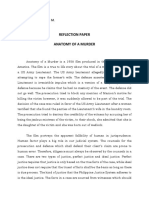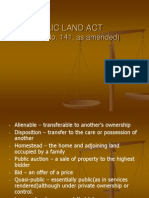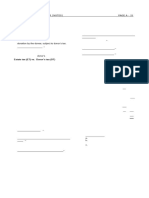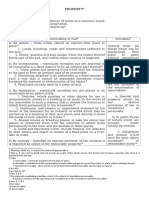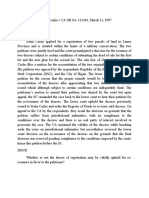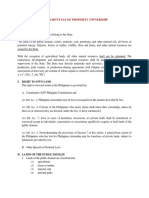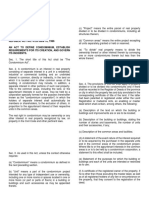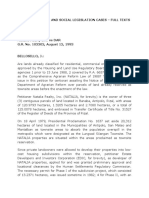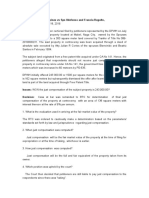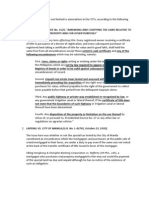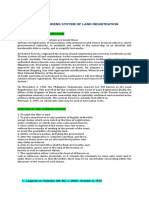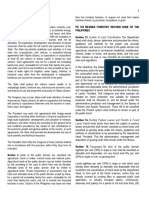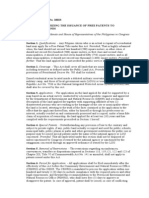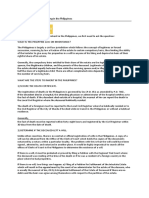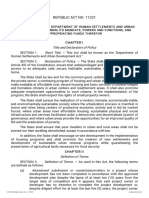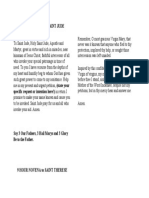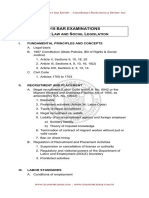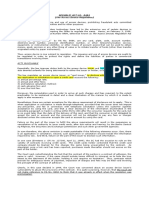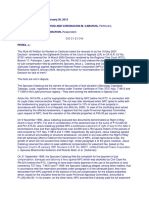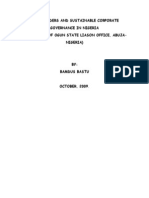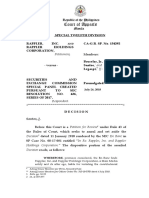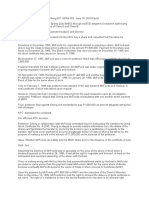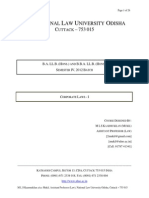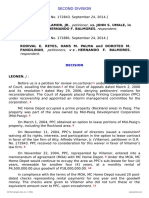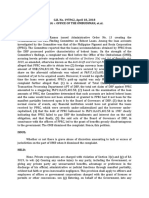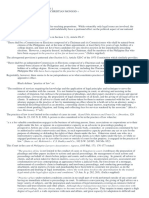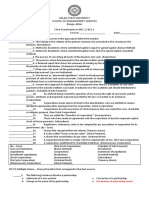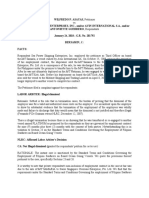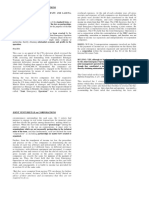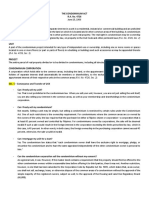Masaoy, Queencel Mae M. Homestead I. Background Homestead Is A Mode of Acquiring Alienable and Disposable Lands
Masaoy, Queencel Mae M. Homestead I. Background Homestead Is A Mode of Acquiring Alienable and Disposable Lands
Uploaded by
fullpizzaCopyright:
Available Formats
Masaoy, Queencel Mae M. Homestead I. Background Homestead Is A Mode of Acquiring Alienable and Disposable Lands
Masaoy, Queencel Mae M. Homestead I. Background Homestead Is A Mode of Acquiring Alienable and Disposable Lands
Uploaded by
fullpizzaOriginal Description:
Original Title
Copyright
Available Formats
Share this document
Did you find this document useful?
Is this content inappropriate?
Copyright:
Available Formats
Masaoy, Queencel Mae M. Homestead I. Background Homestead Is A Mode of Acquiring Alienable and Disposable Lands
Masaoy, Queencel Mae M. Homestead I. Background Homestead Is A Mode of Acquiring Alienable and Disposable Lands
Uploaded by
fullpizzaCopyright:
Available Formats
MASAOY, QUEENCEL MAE M.
This provision classifies lands of the public domain into agricultural,
forest or timber, mineral lands, and national parks. Agricultural lands
HOMESTEAD
I.
of the public domain may be further classified by law according to
the uses to which they may be devoted. Of the above classes, only
Background
agricultural lands of the public domain may be subject to alienation.
Homestead is a mode of acquiring alienable and disposable lands
of the public domain through administrative proceedings for
Under the Public Land Act, lands of the public domain used to be
agricultural purposes conditioned upon actual cultivation and
classified into (1) alienable or disposable lands, (2) timber lands,
residence. The homestead program allows enterprising tenants to
and (3) mineral lands.
acquire a farm of at least 16 hectares to cultivate. It aims to
distribute disposable agricultural land to destitute citizens for their
For purposes of administration and disposition, the lands of the
home and cultivation that is; to give a place for the family, a parcel
public domain classified as disposable or alienable are sub-
of land where the home is constructed, with enough portions of the
classified according to the use or purposes to which such lands are
land to sustain the family.
destined, as follows:
The Public Land Act or Commonwealth Act No. 141 of 1936, as
(a) Agricultural;
amended by Commonwealth Act No. 456, codified existing laws
(b) Residential, commercial, industrial, or for similar
relative to lands of public domain including the Homestead Law of
productive purposes;
1903.It governed the disposition of such lands, and prescribed rules
(c) Educational, charitable, or other similar purposes;
and regulations of homesteading, selling, and leasing of portions of
(d) Reservations for town sites and for public and quasi-
the public domain. In addition, it also prescribed the terms and
public uses.
conditions to enable persons to perfect their titles to public lands in
the Philippines.
It may be stated that lands that do not belong to anybody
Article XII, Section 3, of the 1987 Constitution of the Philippines,
states:
necessarily fall within the category of property of public ownership,
whether under the Regalian Doctrine or under Art. XII, Section 2, of
the 1987 Constitution, for the simple reason that they have no
Lands of the public domain are classified into agricultural,
forest or timber, mineral lands and national parks.
Agricultural lands of the public domain may be further
classified by law according to the uses to which they may
be devoted. Alienable lands of the public domain shall be
known or recognized owner. Unless such lands are needed for
public or common use or service, they do not fall under Article 420
of the Civil Code, but under Article 421 of the same Code, thus
making them patrimonial, and capable of disposition to those
qualified to acquire lands of the public domain.1
limited to agricultural lands. Private corporations or
associations may not hold such alienable lands of the
public domain except by lease, for a period not exceeding
twenty-five years, renewable for not more than twenty-five
years, and not to exceed one thousand hectares in area.
Citizens of the Philippines may lease not more than five
hundred hectares, or acquire not more than twelve
Thus, only those lands classified as disposable or alienable may be
the subject of an application for Homestead. Anyone who applies for
confirmation of imperfect title has the burden of proof to overcome
the presumption that the land sought to be registered forms part of
the public domain. The classification of public lands is an exclusive
prerogative of the Executive Department.
hectares thereof, by purchase, homestead, or grant.
Taking into account the requirements of conservation,
ecology,
and
development,
and
subject
to
the
II.
Qualification for Homestead Grant
requirements of agrarian reform, the Congress shall
determine, by law, the size of lands of the public domain
which may be acquired, developed, held, or leased and
The Public Land Act provides that any citizen of the Philippines, who
is a natural person, over the age of eighteen (18) years, or the head
the conditions therefor.
1 Registration of Land Titles and Deeds, Narciso Pena, pg 562-563
1
of a family, may enter a homestead of not exceeding twelve
SEC. 103. Certificates of title pursuant to patents.
hectares of agricultural land of the public domain. The applicant
Whenever public land is by the Government alienated,
must have cultivated and improved at least one-fifth of the land
granted or conveyed to any person, the same shall be
continuously since the approval of the application and resided for at
brought forthwith under the operation of this Decree. It
least one year in the municipality in which the land is located, or in a
shall be the duty of the official issuing the instrument of
municipality adjacent to the same, and then, upon payment of the
alienation, grant, patent or conveyance in behalf of the
required fee, he shall be entitled to a patent.
government to cause such instrument to be filed with the
Registrar of Deeds of the province or city where the land
A corporation, regardless of the nature of its business, is expressly
lies, and to be there registered like other deeds and
forbidden by law to acquire or have any right, title, or interest in and
conveyance, whereupon a certificate of title shall be
to lands granted under free, homestead, or individual sale patent, or
entered as in other cases of registered land, and an
to any improvements thereon, where such lands are to be devoted
owners duplicate issued to the grantee. The deed, grant,
to purposes other than educational, religious, charitable, or
patent or instrument of conveyance from the Government
easement of way. Besides that restriction it is further required that
to the grantee shall not take effect as a conveyance or
the acquisition be subject to the consent of the grantee or patentee
bind the land, but shall operate only as a contract between
and the approval of the Secretary of Agriculture and Natural
the Government and the grantee, and as evidence of
Resources. A closed corporation whose stockholders are the
authority to the Registrar of Deeds to make registration. It
assignors themselves and their children, although the transfer will
is the act of registration that shall be the operative act to
not divest them of the beneficial use of and control over the
effect and convey the land, and in all cases, under this
property, is not an exception.
Decree, registration shall be made in the office of
Registrar of Deeds of the province or city where the land
However, under Section 121 of Commonwealth Act No. 141, as
lies. The fees for registration shall be paid by the grantee.
amended by Commonwealth Act No. 615, a corporation may
After due registration and issuance of the certificate of
acquire a homestead from a grantee with the consent of the latter
title, such land shall be deemed to be registered land to all
and the approval of the Secretary of Agriculture and Natural
intents and purposes under this Decree.
Resources, but solely for education, religious or charitable purposes
or for a right of way. However, where the land involved was granted
to the homesteader by virtue of an earlier legislation, such as Act
No. 2874, as amended by Act No. 3517, a corporation may acquire
such
homestead
even
for
commercial
purposes,
and
not
necessarily for industrial, educational or charitable purposes or for a
right of way. In other words, the acquisition by such corporation will
The procedure for the acquisition of a homestead settlement is an
administrative function and may be outlined in their chronological
order as follows:
(1) Filing of the application with the Director of Lands;
be governed by the particular law under which the homestead was
(2) Upon approval of said application, the Director of
granted.3
Lands shall authorize the applicant to take possession of
III.
Procedure for the Acquisition of Homestead
Settlements
The registration of the homestead grant or patent involving
the land upon payment of P5.00 as entry fee;
(3) Within six months from the approval of the
application,the applicant must begin cultivation of the land.
a parcel of disposable public land is governed by Section 122 of Act
He must cultivate at least one-fifth of the land for a period
No. 496, (Now Sec. 103 of Presidential Decree 1529):
of not less than one nor more than five years from the
date of the approval of the application;
LRC Consulta No. 84, Register of Deeds of Davao v. Dakudao &
Sons, Inc., April 11, 1956
(4) The applicant proves satisfactorily to the Director of
Lands that he has resided continuously for at least one
year in the municipality where the land is situated or in a
3 LRC Consulta No. 201,Manila Blue Printing Co. v. Register of
Deeds of Nueva Ecija, July 16, 1958
municipality adjacent thereto and has cultivated at least
one-fifth of the land. Before submitting his final proof
relative to the compliance of the law, he must give due
mere investigation report submitted by an official of the Bureau of
notice to the public of his intention to make such proof;
Lands who drew the sketch of the land showing the improvements
existing thereon is insufficient to establish the right of an applicant to
(5) The Director of Lands, satisfied that the applicant has
complied with the requisites of the law, orders, that the
land be surveyed by a surveyor of the Bureau of Lands,
and the corresponding plan thereof prepared;
the land. The findings of the trial court who tried the case and heard
the witnesses on this regard, are not to be disturbed on appeal,
unless there are substantial facts and circumstances which are
overlooked and which if properly considered might affect the result
(6) The Bureau of Lands prepares the homestead patent
of the case.
issued in the name of the Republic of the Philippines
under the signature of the President of the Philippines;
and
Right to Notice Before Cancellation of Entry
(7) Certified copy of the Patent is sent to the Registrar of
If, before the expiration of time provided by law for the making of
Deeds of the province where the land lies for the
final proof, it shall be proven, after due notice to the homesteader,
registration of the same. Thereupon, an original certificate
that the land entered is not subject to homestead entry or that the
is issued to the patentee in accordance with Section 122
homesteader had failed to comply with the provisions of the Public
of Act No. 496, in relation to the Public Land Act.
Land Act, the Director of Lands may cancel the entry. Section 16 of
Commonwealth Act No. 141 provides:
Section 14, Commonwealth Act No. 141 requires that the applicant
must have possessed and cultivated the land subject of the
SECTION 16. If at any time before the expiration of the
application. No application shall be issued if there is no cultivation of
period allowed by law for the making of final proof, it shall
at least one-fifth of the land. The law reads:
be proven to the satisfaction of the Director of Lands, after
due notice to the homesteader, that the land entered is
No certificate shall be given or patent issued for the land
under the law not subject to home-stead entry, or that the
applied for until at least one-fifth of the land has been
homesteader has actually changed his residence, or
improved and cultivated. The period within which the land
voluntarily abandoned the land for more than six months
shall be cultivated shall not be less than one nor more
at any one time during the years of residence and
than five years, from and after the date of the approval of
occupation herein required, or has otherwise failed to
the application. The application shall, within the said
comply with the requirements of this Act, the Director of
period, notify the Director of Lands as soon as he is ready
Lands may cancel the entry.
to acquire the title. If at the date of such notice, the
applicant shall prove to the satisfaction of the Director of
Lands, that he has resided continuously for at least one
year in the municipality in which the land is located, or in a
municipality adjacent to the same, and has cultivated at
least one-fifth of the land continuously since the approval
of the application, and shall make affidavit that no part of
said land has been alienated or encumbered, and that he
has complied with all the requirements of this Act, then,
In Ayson v. Republic of the Philippines6, a homestead entry was
cancelled by the Lands Department upon recommendation of the
lands inspector who investigated the case ex parte without giving
due notice to the homesteader or his heirs. The Supreme Court held
that such cancellation was null and void for being in contravention of
Section 16 of the Public Land Act.
upon the payment of five pesos, as final fee, he shall be
entitled to a patent.
IV.
Rights and Restrictions in Disposition of Homestead
Fact of Possession and Cultivation Must be Proved
In Quinsay vs. Intermediate Appellate Court5, the Supreme Court
held that the fact of possession and cultivation must be proved. A
4Noblejas, A., et al. 2007: Registration of Land Titles and Deeds.
Manila: Rex Book Store, pp.511-512
5 G.R. No. L-67935, March 18, 1991
6 G.R. No. L-6614, November 29, 1954
3
A vested right "is some right or interest in property which has
Philippine Legislature, to citizens of countries the laws of
become fixed and established and is no longer open to doubt or
which grant to citizens of the Philippine Islands the same
controversy." (Downs vs. Blount, 1912)
right to acquire, hold, lease, encumber, dispose of, or
alienate land, or permanent improvements thereon, or any
Where the right of a homesteader to a patent for land has become
interest therein, as to their own citizens, only in the
vested in a purchaser, the Government holds the legal title in trust
manner and to the extent specified in such laws, and while
for the purchaser until the patent is issued. (United States vs.
the same are in force, but not thereafter.
Freyberg, 1886)
Section 122. Any acquisition, conveyance, alienation,
The execution and delivery of the patent are the mere ministerial
transfer, or other contract made or executed in violation of
acts of the officer charged with that duty.
any of the provisions of Sections 116, 118, 119, 120 and
The following provisions of the Public Lands act provide for the
prohibition and alienation of land under Homestead and Free
Patent:
121 of this act shall be unlawful and null and void from its
execution and shall produce the effect of annulling and
cancelling the grant, title, patent, or permit originally
issued,
Section 116. Except in favor of the Government or any of
its branches, units or institutions, or legally constituted
banking corporations, lands acquired under the free
patent or homestead provisions shall not be subject to
encumbrance or alienation from the date of the approval
of the application and for a term of five years from and
after the date of issuance of the patent or grant, nor shall
they become liable to the satisfaction of any debt
contracted prior to the expiration of said period; but the
improvements or crops on the land may be mortgaged or
pledged
to
qualified
persons,
associations,
or
corporations. (As amended by Section 23 of Act No.
3517).
or
confirmed,
actually
or
presumptively, and cause the reversion of the property
and its improvements to the Government.
Section 122(A). The provisions of Sections 23, 24, 34, 57,
120 and 121, and any other provisions or provisions
restricting or tending to restrict the right of persons,
corporations, or associations to acquire, hold, lease,
encumber, dispose of, or alienate land in the Philippines,
or permanent improvements thereon, or any interest
therein, shall not be applied in cases in which the right to
acquire, hold or dispose of such land, permanent
improvements thereon or interests therein in the Philippine
Islands is recognized by existing treaties in favor of
citizens or subjects of foreign nations and corporations or
Section 119. Except with the consent of the grantee and
the approval of the Secretary of Agriculture and Natural
Resources,
recognized,
and
solely
for
commercial,
industrial,
educational, religious or charitable purposes or for a right
of way, no corporation, association, or partnership, may
acquire or have any right, title, interest, or property right
whatsoever to any land granted under the free patent,
homestead or individual sale provisions of this Act or to
any permanent improvement on such land. (As amended
by Section 24 of Act. No. 3517).
Section 120. No land originally acquired in any manner
under the provisions of this Act, nor any permanent
improvement on such land, shall be encumbered,
alienated, or transferred, except to persons, corporations,
associations, or partnerships who may acquire lands of
the public domain under this Act; to corporations
organized in the Philippine Islands authorized therefor by
their charters, and upon express authorization by the
associations organized and constituted by the same,
which right in so far as it exists under such treatise, shall
continue and subsist in the manner and to the extent
stipulated in said treaties, and only while these are in
force, but not thereafter.
Encumbrances has been defined as anything that impairs the use or
transfer of property, anything which constitutes a burden on the title,
a burden, charge or lien upon property. 7
The restriction on the enjoyment of property imposed by a contract
of lease sufficiently meets the definition of an encumbrance under
Section 118 of the Public Land Act because such contract impairs
the use of the property by the grantee during the term of the lease,
the granting of the patent can not enjoy the beneficial use of the
land leased. Even if only part of the property has been sold or
alienated within the prohibited period of five (5) years, such
7 Registration of Land Titles and Deeds, Narciso Pena, pg. 281
4
alienation is sufficient cause for the reversion of the whole estate to
Under Act No. 926, which is the first Public Land Act passed by the
the state.8
Philippine Commission on October 7, 1903; there is no prohibition
against the disposition of a homestead within five years from the
From the date of the approval of the application and for a term of
issuance of the patent. Hence, where vested rights in a homestead
five years from and after the date of issuance of the patent or grant,
were acquired under said Act No. 926 the sale of such land within
lands acquired under free patent or homestead cannot be subject to
five years from the issuance of the homestead patent is valid and
encumbrances or alienation, nor shall they become liable to the
binding.
satisfaction of any debt contracted prior to the expiration of said
period, except in favor of the Government or any of its branches,
Neither will the prohibition within the same period of five years apply
units or institutions. But in the case of Ybaez v. Intermediate
to an agreement for the partition of a homestead inasmuch as a
Appellate Court , the improvements or crops on the land may be
partition is not a conveyance or an alienation in the legal
mortgaged or pledged to qualified persons, associations, or
contemplation and does not run counter to the pertinent provision of
corporations.
the Public Land Law.
As to the land, where a debt was contracted within the said period,
After five years from the issuance of the patent and within twenty-
even if it was agreed that such debt shall be payable after five
five years after the issuance of title, no alienation, transfer or
years, the homestead cannot be made liable to the satisfaction of
conveyance of any homestead may be made without the approval
such debt. Neither may it be validly agreed that in case of
of the Secretary of Natural Resources, which approval cannot be
nonpayment of the loan so contracted, the debtor would execute a
denied except on constitutional and legal grounds. However, the
deed selling or assigning the land to the creditor for the same
sale of a
amount in payment of the debt after the five-year period. For this
homestead before the expiration of said period of twenty-five years
may be considered practically a sale of the homestead to satisfy a
is not rendered null and void by the failure to obtain the required
debt contracted within the five-year period, which is the very event
approval from the Secretary. The required approval may be
which the law seeks to prevent. And it is immaterial whether the
regarded as directory; hence, in a case of necessity it may be
satisfaction of the debt be made either by a voluntary sale or
applied for even after the sale had been consummated.11
through judicial proceeding as when the property is levied upon and
sold at public auction because the spirit of the law may be defeated
However, alienations or encumbrances made in favor of the
either way.
government or of any of its branches or legally constituted banking
corporations are exempted from the prohibition that the land granted
Under the provision of Section 5 of Republic Act 720, otherwise
under a homestead title cannot be encumbered or alienated within
known as the Rural Bank Act, as amended by Republic Act 5939, in
the period of five years from the date of the issuance of the patent.
the granting of loans by such rural banks primarily for the purpose of
The Philippine National Bank being a government-controlled
meeting normal credit needs of any small farmer or farm family
banking corporation, the execution of a judgment in its favor against
owning or cultivating, in the aggregate, not more than fifty hectares
a homestead is, therefore, valid and legal.12
of land dedicated to agricultural production, as well as the normal
credit needs of cooperatives and small merchants, the latter whose
capital investment does not exceed P25,000.00, homestead or free
patent lands, even pending issuance of titles but already approved,
may be offered and accepted, as security, provided that when the
corresponding titles are issued, the same shall be delivered to the
V.
Alienation, Mortgage, Redemption, Expropriation
Register of Deeds of the province where such lands are situated for
the annotation of encumbrance.10
10 Registration of Land Titles and Deeds, Narciso Pena, pg. 383
8 Republic vs. CA, 281 SCRA 639
11 Registration of Land Titles and Deeds, Narciso Pena, pg. 576-578
9 Ybaez v. Intermediate Appellate Court, 194 SCRA 743.
12 Philippine National Bank v. Espinosa, 66 Phil. 716.
5
Alienation
Redemption is the way for the owner to retrieve his land that has
been mortgaged or pledged. It is done through a payment of the
Alienation is defined as the capacity for a piece of property or a
property right to be sold or otherwise be transferred from one party
to another. Although property is generally deemed to be alienable,
debt owed or a fulfillment of an obligation. In other words, he right of
redemption is the legal right of a mortgagor who owns a real estate
to reclaim his or her property.
it may also be the subject of alienation. In relation to homestead,
Section 118 of Republic Act (R.A.) No. 141 states that:
The provision on reconveyance is stated in Section 119 of R.A. No.
141 that says: Every conveyance of land acquired under the free
Except in favor of the Government or any of its
branches, units, or institutions, lands acquired
under free patent of homestead provisions shall
both subject to encumbrance or alienation from
the date of the approval of the application and
for a term of five years from and after the date of
issuance of the patent of grant, nor shall they
become liable to the satisfaction of any debt
contracted prior to the expiration of aid period,
but the improvements or crops on the land may
be mortgaged or pledged to qualified persons,
associations, or corporations.
No alienation, transfer, or conveyance of any
homestead after five years and before twentyfive years after issuance of title shall be valid
without the approval of the Secretary of
Agriculture and Commerce, which approval shall
not be denied except on constitutional and legal
grounds.
Another important provision regarding alienation of homestead
grants is stated in the last sentence of Section 122 (2) of R.A. 141
patent or homestead provisions, when proper, shall be subject to
repurchase by the applicant, his widow, or legal heirs, within a
period of five years from the date of the conveyance. Further, in the
case of Manuel v. PNB, et.al. the court ruled that the land acquired
through the free patent program can no longer be reconveyed
because the action was brought only after the lapse of 13 years. It
must be noted that the debtor, his successors-in-interest, or any
judicial creditor or a judgment creditor may redeem the property at
any time within the term of 1 year from the date of the sale and is
governed by the Rules of Court. When the property is redeemed
after the purchaser has been given the possession, the redeemer is
entitled to deduct from the price of redemption any rentals that the
purchaser may have collected in case the property of any part of it
was rented. If the property was used as his own dwelling, it being
town property, or used it gainfully, it being rural property, the
redeemer may deduct from the price an interest of 1% per month
under Section 9 of Act No. 3135.
In case of judicial foreclosure, the redemption period is within 1
year. But for extrajudicial foreclosure, the redemption period is
within 90 days from the sale or registration.
A Homesteader is not barred by pari delicto
which states: Any transfer, assignment, or lease made in violation
hereof, shall be null and void.
Where a homestead was illegally sold in violation of the homestead
law, the principle of in pari delicto is not applicable. Reason for the
A homestead grant is a grant given by the State to qualified persons
who registered for a free patent application by the Government. But,
any violation of R.A. No. 141 especially to the prescribed periods of
5 years and 25 years shall be followed. Otherwise, the land given
rule is that the policy of the law is to give land to a family for home
and cultivation and the law allows the homesteader to reacquire the
land even if it has been sold; hence, the right may not be
waived.
shall be forfeited and it will go back to the Government. Thus, it was
held in the case of Republic of the Philippines v. Court of Appeals
In the case of Angeles, et al. v. Court of Appeals, et al. 13, the sale of
(G.R. No. 100709. November 14, 1997) that the petitioner, Morato
the homestead by the deceased homesteader within five years from
violated the prohibitory period of five years when he leased the land
the issuance of the patent was null and void and his heirs have the
to Nenita Co and Atonio Quilatan which now cancelled the free
right to recover the homestead illegally disposed of. The sale being
patent given to her and now reverts back to the State. Alienation is
void, the action to recover the homestead does not prescribe
prohibited within the first 5 years because of the notion that the land
because mere lapse of time cannot give efficacy to contracts that
is to help her and her family as well as her heirs in the future.
are null and void and inexistent.63 In fact, the vendor never lost his
title or ownership over the homestead, and for that reason there is
Redemption
13 Angeles, et al. v. Court of Appeals, et al., 102 Phil. 1006
6
no need for him to repurchase the same from the vendee, nor for
Sec. 122. No land originally acquired in any manner
the latter to execute a deed of reconveyance in his favor. The case
under the provisions of this Act, nor any permanent
stands actually for mutual restitution, incident to the nullity of the
improvement on such land, shall be encumbered,
conveyance. However, that the alienation of a homestead, whether
alienated or transferred, except to persons, corporations,
in whole or in part, within the prohibitive period is a sufficient cause
association, or partnerships who may acquire lands of the
for reversion to the State of the whole grant.
14
public domain under this Act or to corporations organized
in the Philippines authorized therefore by their charters.
Except in cases of hereditary successions, no land or any
Expropriation and Mortgage
portion thereof originally acquired under the free patent,
COMMONWEALTH ACT NO. 456 - AN ACT TO AMEND
homestead, or individual sale provisions of this Act, or any
SECTIONS NINETEEN, TWENTY, AND ONE HUNDRED AND
permanent
EIGHTEEN
ONE
transferred or assigned to any individual, nor shall such
HUNDRED FORTY-ONE, COMMONLY KNOWN AS THE PUBLIC
land or any permanent improvement thereon be leased to
LAND ACT
such individual, when the area of said land, added to that
OF
COMMONWEALTH ACT NUMBERED
improvement
on
such
land,
shall
be
of his own, shall exceed one hundred and forty-four
"Section 118. Except in favor of the Government or any of
its branches, units, or institutions, lands acquired under
hectares. Any transfer, assignment, or lease made in
violation hereto shall be null and void.
free patent or homestead provisions shall not be subject
to encumbrance or alienation from the date of the
As a general rule, lands acquired under free patent or homestead
approval of the application and for a term of five years
provisions are prohibited to be subject to any form of encumbrance
from and after the date of issuance of the patent or grant,
or alienation from the date of approval of the application and for a
nor shall they become liable to the satisfaction of any debt
term of five years from and after the issuance of the patent or grant,
contracted prior to the expiration of said period, but the
nor become liable to the satisfaction of any debt contracted prior to
improvements or crops on the land may be mortgaged or
the expiration of said period. However, the improvements or crops
pledged
on the land may be mortgaged or pledged to qualified persons,
to
qualified
persons,
associations,
or
corporations.
associations, or corporations.
The approval of secretary on the
other hand is merely directory, its absence doesnt invalidate any
"No alienation, transfer, or conveyance of any homestead
after five years and before twenty-five years after
alienation, transfer or conveyance of the homestead after 5 years
and before the 25- year period.
issuance of title shall be valid without the approval of the
Secretary of Agriculture and Commerce, which approval
Such encumbrance results in the cancellation of the grant and the
shall not be denied except on constitutional and legal
reversion of the land to the public domain. Encumbrance has been
grounds."
defined as anything that impairs the use or transfer of property;
anything which constitutes a burden on the title; a burden or charge
Sec. 121. Except with the consent of the grantee and the
approval of the Secretary of Agriculture and Natural
Resources, and solely for educational, religious, or
charitable purposes or for a right of way, no corporation,
association, or partnership may acquire or have any right,
title, interest, or property right whatsoever to any land
granted under the free patent, homestead, or individual
sale provisions of this Act or to any permanent
improvement on such land. (As amended by Com. Act
No. 615, approved May 5, 1941)
14 Rep. of the Philippines vs. Garcia, 105 Phil. 826
upon property; a claim or lien upon property. It may be a legal claim
on an estate for the discharge of which the estate is liable; an
embarrassment of the estate or property so that it cannot be
disposed of without being subject to it; an estate, interest, or right in
lands, diminishing their value to the general owner; a liability resting
upon an estate. (Republic v. CA, et. al., November 14, 1997)
The purpose of the prohibition or policy of the law is to conserve the
land which a grantee has acquired under the Public Land Act for
him and his heirs, and to give the patentee a place where to live
with his family so he may become a happy citizen and useful
member of the society. Their object is to provide a home for each
citizen of the Government, where his family may shelter and live
beyond the reach of financial misfortune, and to inculcate in
individuals those feelings of independence which are essential to
was sold to other parties, the private respondents could still have
the maintenance of free institutions. Furthermore, the state itself is
repurchased the same from the subsequent vendees. But since the
concerned that the citizens shall not be divested of a means of
land was expropriated by the Government, and the private
support, and reduced to pauperism. (Cook and Burgwall vs.
respondents could no longer repurchase the same, reason, justice
McChristian, 4 Cal., 24; Franklin vs. Coffee, 70 Am. Dec., 292;
and equity demand that they receive the compensation therefore
Richardson vs. Woodward, 104 Fed. Rep., 873; 2l Cyc., 459).
less the amount adverted to above, for such compensation merely
substitutes for the land they are entitled to. Hence, the rules on
In Pascua vs. Talens, the Court reiterated that the homestead laws
were designed to distribute disposable agricultural lots of the State
to land-destitute citizens for their home and cultivation. Pursuant to
redemption in the case of an extrajudicial foreclosure of land
acquired under free patent or homestead statutes may be
summarized as follows:
such benevolent intention the State prohibits the sale or
encumbrance of the homestead (Section 116) within five years after
If the land is mortgaged to a rural bank under R.A. No.
the grant of the patent. After that five-year period the law impliedly
720, as amended, the mortgagor may redeem the
permits alienation of the homestead; but in line with the primordial
property within two (2) years from the date of foreclosure
purpose to favor the homesteader and his family the statute
or from the registration of the sheriff's certificate of sale at
provides that such alienation or conveyance (Section 117) shall be
such foreclosure if the property is not covered or is
subject to the right of repurchase by the homesteader, his widow or
covered, respectively, by a Torrens title.
heirs within five years. This Section 117 is undoubtedly a
If the mortgagor fails to exercise such right, he or his heirs
complement of Section 116. It aims to preserve and keep in the
may still repurchase the property within five (5) years from
family of the homesteader that portion of public land which the State
the expiration of the two (2) year redemption period
had gratuitously given to him. It would, therefore, be in keeping with
pursuant to Section 119 of the Public Land Act (C.A. No.
this fundamental idea to hold, as we hold, that the right to
141).
repurchase exists not only when the original homesteader makes
the conveyance, but also when it is made by his widows or heirs.
This construction is clearly deducible from the terms of the statute.
As an exemption to the proviso, except in favor of the Government
or any of its branches, units, or institutions pertains to the States
inherent power of eminent domain as a superior right of the State to
RELEVANT JURISPRUDENCE
acquire private property whether registered or not for public use
upon
payment
of
just
compensation,
through
expropriation
ALEJANDRO DINAYUG and ANA DINA YUG, Petitioners,
proceedings.
vs.
Imperium and Dominuum. Imperium pertains to the government
authority possessed by the State, which is appropriately embraced
in the concept of sovereignty; and Dominuum pertains to the
EUGENIO UGADDAN, NORBERTO UGADDAN, PEDRO
UGADDAN, ANGELINA UGADDAN, TERESO UGADDAN,
DOMINGA UGADDAN, GERONIMA UGADDAN, and BASILIA
LACAMBRA, Respondents.
capacity to own and acquire property; foundation of the theory of
G.R. No. 181623
Regalian doctrine.
In the case of RURAL BANK OF DAVAO CITY, INC. v. COURT OF
APPEALS
and
GABRIEL
ABELLANO
and
FRANCISCO
December 5, 2012
FACTS:
SEQUITAN, the expropriation case begun before the foreclosure
At the crux of this controversy are two parcels of land located in
sale and was brought against the private respondents, among other
Barangay Libag, Tuguegarao, Cagayan registered under the name
parties. The court's order for the payment of compensation was
of Gerardo Ugaddan, husband of respondent Basilia Lacambra and
entered and the compliance thereof by the NHA was made within
father of the other respondents Eugenio, Norberto, Pedro, Angelina,
the private respondents' 5-year repurchase period. Although the
Tereso, Dominga, and Geronima, all bearing the surname Ugaddan.
petitioner had a Transfer Certificate of Title over the lot at the time of
payment, its right thereto was subject to the private respondents'
Gerardo acquired title over the subject properties through the grant
right to repurchase. Instead of having been expropriated, the land
of Homestead Patent No. V-6269 in his favor on January 12, 1951.
Upon Gerardos death, respondents discovered that the certificate
Yes. To reiterate, Section 118 of the Public Land Act, as amended,
of title had been cancelled. The records of the Registry of Deeds
reads that "except in favor of the Government or any of its
show that Gerardo, with the consent of his wife Basilia, sold the
branches, units, or institutions, or legally constituted banking
subject properties to Juan Binayug. As a result of the sale,
corporations, lands acquired under free patent or homestead
Certificate of Title in Gerardos name was cancelled and Transfer
provisions shall not be subject to encumbrance or alienation from
Certificate of Title in Juans name was issued. Juan was the father
the date of the approval of the application and for a term of five
of petitioner Alejandro Binayug and the subject properties passed
years from and after the date of issuance of the patent or grant x
on to him and his wife Ana Ugaddan Binayug upon Juans death.
xx." The provisions of law are clear and explicit. A contract which
purports to alienate, transfer, convey, or encumber any homestead
Respondents averred that the purported sale between Gerardo and
Juan was prohibited under Commonwealth Act No. 141, otherwise
known as the Public Land Act, as amended; and that the Absolute
within the prohibitory period of five years from the date of the
issuance of the patent is void from its execution. In a number of
cases, this Court has held that such provision is mandatory.
Deed of Sale dated July 10, 1951 between Gerardo (with Basilias
consent) and Juan was forged.
In the present case, it is settled that Homestead Patent No. V-6269
was issued to Gerardo on January 12, 1951 and the Absolute Deed
The RTC found that petitioners have been in possession of the
subject properties for some time now. Petitioners were able to
support their testimonies with tax declarations and official receipts,
proving that they and their predecessor-in-interest have been
paying real property tax on the subject properties.
The RTC then declared the Absolute Deed of Sale dated July 10,
1951 as null and void for the following reasons:
First, as proven by the testimonies of [respondents]
witnesses, the marital consent was not obtained by
Gerardo. Second, Section 118 of the Public Land Law,
amended by Commonwealth Act No. 456.
of Sale between Gerardo and Juan was executed on July 10, 1951,
after a lapse of only six months. Irrefragably, the alienation of the
subject properties took place within the five-year prohibitory period
under Section 118 of the Public Land Act, as amended; and as
such, the sale by Gerardo to Juan is null and void right from the
very start.
As a void contract, the Absolute Deed of Sale dated July 10, 1951
produces no legal effect whatsoever in accordance with the
principle "quod nullum est nullum producit effectum," 2 thus, it could
not have transferred title to the subject properties from Gerardo to
Juan and there could be no basis for the issuance of TCT No. T106394 in Juans name. A void contract is also not susceptible of
A homestead patent cannot be alienated or encumbered within five
ratification, and the action for the declaration of the absolute nullity
(5) years from the approval of application except in favor of the
of such a contract is imprescriptible.
government or any of its branches or institutions. Where a
homestead was sold during the prohibited period, even if the sale is
approved by the Director of Lands subsequently after five (5) years,
the approval will not give it any valid curative effect. Such sale is
illegal, inexistent, and null and void ab initio. The action to declare
the existence of such contract will not prescribe. As a matter of fact,
the vendor never lost his title or ownership over the homestead, and
there is no need for him or his heirs to repurchase the same from
the vendee, or for the latter to execute a deed of reconveyance. Of
Jurisprudence, therefore, supports the return of the subject
properties to respondents as Gerardos heirs following the
declaration that the Absolute Deed of Sale dated July 10, 1951
between Gerardo and Juan is void for being in violation of Section
118 of the Public Land Act, as amended. That the subject properties
should revert to the State under Section 124 of the Public Land Act,
as amended, is a non-issue, the State not even being a party
herein.
course, the purchaser may recover the price which he has paid, and
where the homesteader vendor died, the recovery may be pursued
as a claim filed against his estate in the corresponding proceeding.
ISSUE:
Whether or not Section 118 of the Public Land Act is applicable to
the case.
HEIRS OF MAXIMO LABANON, represented by ALICIA
LABANON CAEDO and the PROVINCIAL ASSESSOR OF
COTABATO, Petitioners,
HELD:
vs.
HEIRS OF CONSTANCIO LABANON, represented by ALBERTO
MAKILANG, Respondents.
G.R. No. 160711
1. Whether
or
of MAXIMO LABANON be
August 14, 2004
not
the OCT
now
issued
considered
the name
indefeasible
and
conclusive; and
2. Whether
FACTS:
or
not
the Trust
Agreement allegedly made
by Constancio Labanon and Maximo Labanon prescribed.
Constancio Labanon settled upon a piece of alienable and
disposable public agricultural land situated in Kidapawan, Cotabato.
He cultivated the said lot and introduced permanent improvements.
Constancio asked his brother, Maximo, who was better educated
to file a public land application under the express agreement that
they will divide the said lot as soon as it would be feasible for them
to do so.
HELD:
1.
No. Section 32 of PD 1529 does not totally deprive a party
of any remedy to recover the property fraudulently registered in the
name of another. It merely precludes the reopening of the
registration proceedings for titles covered by the Torrens System,
During the time of the application it was Constancio who continued
to cultivate the said lot. The Homestead Application was approved
and an Original Certificate of Title over said lot was issued in favor
of Maximo Labanon. Maximo Labanon executed a document
denominated as Assignment of Rights and Ownership to
safeguard the ownership and interest of his brother Constancio
but does not foreclose other remedies for the reconveyance of the
property to its rightful owner. While it is true that Section 32 of PD
1529
provides
that
the decree of registration
becomes incontrovertible after a year, it does not altogether deprive
an aggrieved party of a remedy in law. The acceptability of
the Torrens System would be impaired, if it is utilized to perpetuate
fraud against the real owners. The action for Recovery of
Labanon.
Ownership before the RTC is indeed the appropriate remedy.
Later on, Maximo executed a sworn statement reiterating his desire
that his elder brother, Constancio, his heirs and assigns shall own
the eastern portion of the lot. After the death of Constancio, his heirs
executed an extra-judicial settlement of estate with simultaneous
sale over the aforesaid eastern portion of the lot in favor of Alberto
Makilang, the husband of Visitacion Labanon, one of the children of
2.
No. Maximo Labanon maintained the title over the
property while acknowledging the true ownership of Constancio
Labanon over the eastern portion of the land. The existence of an
express trust cannot be doubted nor disputed. In the case at bar,
Maximo never repudiated the express trust instituted between him
and Constancio. And after Maximos death, the trust could no longer
Constancio.
be
renounced;
thus, respondents right to enforce
Subsequently, the parcel of land was declared for taxation purposes
the trust agreement can
no
in the name of Alberto. The defendants heirs of Maximo caused to
longer be restricted nor prejudiced by prescription.
be
cancelled
from
the
records
of the defendant Provincial Assessor of Cotabato the aforesaid taxd
eclaration and the latter, without first verifying the legality of the
basis
for
said cancellation,
of Constancio
demanded the
cancelled
owners
the
same. The
copy of the
heirs
certificate
of title covering the aforesaid Lot to be surrendered to the Register
of Deeds.
In addition, petitioners can no longer question the validity
of the positive declaration of Maximo Labanon in the Assignment of
Rights and Ownership in favour of the late Constanco Labanon, as
the agreement was not impugned during the formers lifetime and
their cognition of his brothers rights over the eastern portion of the
lot was further affirmed and confirmed in the subsequent Sworn
Statement.
ISSUES:
10
You might also like
- Icare 08 RFBT Final PB and Answer KeyDocument15 pagesIcare 08 RFBT Final PB and Answer KeyJean TatsadoNo ratings yet
- DenrDocument14 pagesDenrkimotosanNo ratings yet
- Anatomy of A Murder Reflection PaperDocument2 pagesAnatomy of A Murder Reflection Paperfullpizza100% (1)
- Acctng Reviewer 2Document21 pagesAcctng Reviewer 2alliahnah33% (3)
- Commonwealth Act No 141Document59 pagesCommonwealth Act No 141Daniel PioquintoNo ratings yet
- CA 141 - Present Public Land ActDocument35 pagesCA 141 - Present Public Land ActMark TanoNo ratings yet
- Pointers:: Oct 28, 1977, Roxas v. Court of Appeals, GR No. 138660, February 5, 2004)Document3 pagesPointers:: Oct 28, 1977, Roxas v. Court of Appeals, GR No. 138660, February 5, 2004)Nowell SimNo ratings yet
- Estate & Donors TaxationDocument8 pagesEstate & Donors TaxationAMNo ratings yet
- Japos-JA-Sum of Money With ReplevinDocument5 pagesJapos-JA-Sum of Money With ReplevinMyrnaJoyPajoJaposNo ratings yet
- LAND - TITLES - AND - DEEDS - REVIEWER Atty. SantiagoDocument49 pagesLAND - TITLES - AND - DEEDS - REVIEWER Atty. SantiagoJohn OrdanezaNo ratings yet
- REVISED URBAN Fundamentals Land Ownership by REX DoneDocument56 pagesREVISED URBAN Fundamentals Land Ownership by REX DoneShaneen AngeliqueNo ratings yet
- Coderias vs. Estate of Juan ChiocoDocument16 pagesCoderias vs. Estate of Juan ChiocoIñigo Mathay RojasNo ratings yet
- LTD Lecture 07192023Document9 pagesLTD Lecture 07192023Emmanuel FernandezNo ratings yet
- Property Bar ReviewDocument45 pagesProperty Bar ReviewRalph HonoricoNo ratings yet
- Judicial Confirmation of Imperfect Titles C.A. 141Document2 pagesJudicial Confirmation of Imperfect Titles C.A. 141Eisley SarzadillaNo ratings yet
- Teofilo Cacho V CADocument2 pagesTeofilo Cacho V CAMay RMNo ratings yet
- What Is Assessor?Document42 pagesWhat Is Assessor?Eloisa YepezNo ratings yet
- Indigenous Peoples Rights Act of 1997Document16 pagesIndigenous Peoples Rights Act of 1997Elaine Grace100% (1)
- Registration of Public LandsDocument2 pagesRegistration of Public LandsGloria NavarroNo ratings yet
- IRR-11201 Dept of Human Settlements and UrbanDocument37 pagesIRR-11201 Dept of Human Settlements and UrbanMcken BelgicaNo ratings yet
- Residential Free Patent LawDocument2 pagesResidential Free Patent LawJave Mike AtonNo ratings yet
- PossessionDocument8 pagesPossessionSeanJethroNo ratings yet
- Board-Resolutions BR 890Document8 pagesBoard-Resolutions BR 890Roy Dela CruiseNo ratings yet
- Republic V MarasiganDocument5 pagesRepublic V MarasiganJade Palace TribezNo ratings yet
- The Cadastral Law (ACT NO. 2259)Document8 pagesThe Cadastral Law (ACT NO. 2259)RegieReyAgustin100% (2)
- 1 Fundamentals of Property Ownership - 2Document36 pages1 Fundamentals of Property Ownership - 2Mark Anthony P ParedesNo ratings yet
- Ca 141Document32 pagesCa 141Majen Pedro100% (1)
- Ra 4276Document8 pagesRa 4276Monique Allen LoriaNo ratings yet
- Land Laws in The PhilippinesDocument22 pagesLand Laws in The PhilippinesRoger Mahilum Jr.No ratings yet
- RA 9700: Comprehensive Agrarian Reform Law/CARPER (Approved August 7, 2009)Document3 pagesRA 9700: Comprehensive Agrarian Reform Law/CARPER (Approved August 7, 2009)Marcial MilitanteNo ratings yet
- Be It Enacted by The Senate and House of Representatives of The Philippines in Congress AssembledDocument14 pagesBe It Enacted by The Senate and House of Representatives of The Philippines in Congress AssembledPepe T. AmilussinNo ratings yet
- Official Gazette of The Republic of The PhilippinesDocument19 pagesOfficial Gazette of The Republic of The PhilippinesTajimi Castaño100% (1)
- Land Titles and DeedsDocument43 pagesLand Titles and DeedskenNo ratings yet
- Ra 6557Document14 pagesRa 6557April Ann Sapinoso Bigay-PanghulanNo ratings yet
- Agrarian Reform Cases Compilation Full TextDocument626 pagesAgrarian Reform Cases Compilation Full TextPaul SalazarNo ratings yet
- Dao-1996-40 Rev IRR For RA7942 & ADocument170 pagesDao-1996-40 Rev IRR For RA7942 & Abentan5100% (1)
- Act 926 PDFDocument11 pagesAct 926 PDFgivemeasign24No ratings yet
- VERSION-03 AUG 2023-LAND REGISTRATION-04 AUG 2023 (Autosaved) (Autosaved)Document134 pagesVERSION-03 AUG 2023-LAND REGISTRATION-04 AUG 2023 (Autosaved) (Autosaved)bhlequitablepropertyNo ratings yet
- Republic Vs Ildefonso, G. R. No. 202051Document1 pageRepublic Vs Ildefonso, G. R. No. 202051andek oniblaNo ratings yet
- Republic Act No. 8371 Ipra LawDocument15 pagesRepublic Act No. 8371 Ipra Lawvherny_corderoNo ratings yet
- Definition of EncumbranceDocument3 pagesDefinition of EncumbranceamvronaNo ratings yet
- Property CasesDocument22 pagesProperty CasesErlene CompraNo ratings yet
- Historical Background: I. Torrens System of Land RegistrationDocument28 pagesHistorical Background: I. Torrens System of Land RegistrationRosalia L. Completano LptNo ratings yet
- Boracay Island White Paper - R Tenefrancia - July 2010Document22 pagesBoracay Island White Paper - R Tenefrancia - July 2010roselle_t33% (3)
- Joint Ventures in The Philippines Overview PDFDocument22 pagesJoint Ventures in The Philippines Overview PDFYel GonzalesNo ratings yet
- A Report On RA 9904Document88 pagesA Report On RA 9904carlos armonesNo ratings yet
- Ra 8731 (Ipra)Document21 pagesRa 8731 (Ipra)Jr MateoNo ratings yet
- As Amended by DO No. 22, S. of 1987, DAO No. 2, S. of 1988 and DAO No. 6, S. of 1994Document12 pagesAs Amended by DO No. 22, S. of 1987, DAO No. 2, S. of 1988 and DAO No. 6, S. of 1994Richard Villaverde100% (1)
- Ra 7279 UdhaDocument24 pagesRa 7279 Udhajmr constructionNo ratings yet
- LRA Land Acquisition and OwnershipDocument6 pagesLRA Land Acquisition and OwnershipRandolph AlvarezNo ratings yet
- RR No. 1-2024Document2 pagesRR No. 1-2024Anostasia NemusNo ratings yet
- Free PatentDocument19 pagesFree PatentSheena Rhea FaelnarNo ratings yet
- Land Classification ReadingsDocument28 pagesLand Classification ReadingsRheaParaskmklkNo ratings yet
- Dolfo, Petitioner vs. The Register of Deed For The Province of Cavite, Trece Martires, Et Al.Document5 pagesDolfo, Petitioner vs. The Register of Deed For The Province of Cavite, Trece Martires, Et Al.Haze Q.No ratings yet
- Chattel Mortgage Without Separate Promissory NoteDocument2 pagesChattel Mortgage Without Separate Promissory NoteJson GalvezNo ratings yet
- DENR Administrative Order NoDocument8 pagesDENR Administrative Order NoMichael A. SuzonNo ratings yet
- 1964 Rules of Court of The PhilippinesDocument1 page1964 Rules of Court of The PhilippinesArjay BalanquitNo ratings yet
- Free Patent Act (RA 10023)Document11 pagesFree Patent Act (RA 10023)Erwin James Badayos FabrigaNo ratings yet
- Municipal Ordinance No. 267 S. 2008Document4 pagesMunicipal Ordinance No. 267 S. 2008Randolph QuilingNo ratings yet
- Step by Step Guide To Inheriting in The PhilippinesDocument3 pagesStep by Step Guide To Inheriting in The PhilippinesJean PradoNo ratings yet
- REPUBLIC ACT NO. 11201 (Department of Human Settlements and Urban Development ActDocument15 pagesREPUBLIC ACT NO. 11201 (Department of Human Settlements and Urban Development ActYappi NaniNo ratings yet
- Natural Resources: Forest or TimberDocument37 pagesNatural Resources: Forest or Timberlonski sapinNo ratings yet
- LTD-report-final 2aDocument10 pagesLTD-report-final 2aPhoebe BalubarNo ratings yet
- Issuance of Certificate of Origin For Logs, Timber, Lumber and Non-Timber Forest ProductsDocument1 pageIssuance of Certificate of Origin For Logs, Timber, Lumber and Non-Timber Forest ProductsfullpizzaNo ratings yet
- 9 HOUR NOVENA To SAINT JUDEDocument1 page9 HOUR NOVENA To SAINT JUDEfullpizzaNo ratings yet
- Meaning of Expectation of PrivacyDocument3 pagesMeaning of Expectation of PrivacyfullpizzaNo ratings yet
- BarQuestions2BGrp2 PDFDocument44 pagesBarQuestions2BGrp2 PDFfullpizzaNo ratings yet
- Cbfma Process PDFDocument1 pageCbfma Process PDFfullpizzaNo ratings yet
- 2018 Bar Examinations L L S L: Abor Aw and Ocial EgislationDocument6 pages2018 Bar Examinations L L S L: Abor Aw and Ocial EgislationfullpizzaNo ratings yet
- CardDocument6 pagesCardfullpizzaNo ratings yet
- 2016 Bar ExaminationsDocument4 pages2016 Bar ExaminationsfullpizzaNo ratings yet
- #3 Quezon To TeagueDocument8 pages#3 Quezon To TeaguefullpizzaNo ratings yet
- Legalandjudicialethics PDFDocument5 pagesLegalandjudicialethics PDFfullpizzaNo ratings yet
- PP Vs ArcillaDocument1 pagePP Vs ArcillafullpizzaNo ratings yet
- PP Vs BrizuelaDocument2 pagesPP Vs Brizuelafullpizza0% (1)
- G.R. No. 186069 January 30, 2013 Spouses Jesus L. Cabahug and Coronacion M. Cabahug, Petitioners, National Power Corporation, RespondentDocument5 pagesG.R. No. 186069 January 30, 2013 Spouses Jesus L. Cabahug and Coronacion M. Cabahug, Petitioners, National Power Corporation, RespondentfullpizzaNo ratings yet
- 12 Phil Veterans Vs CaDocument2 pages12 Phil Veterans Vs Camaria lourdes lopenaNo ratings yet
- Stakeholders and Sustainable Corporate Governance in NigeriaDocument154 pagesStakeholders and Sustainable Corporate Governance in NigeriabastuswitaNo ratings yet
- Chapter 1 Art 1767 1783Document14 pagesChapter 1 Art 1767 1783Mark CalimlimNo ratings yet
- Bonds Application (Corporation)Document14 pagesBonds Application (Corporation)MARISSE LYN DORADONo ratings yet
- CADocument72 pagesCAGeorge Mitchell S. Guerrero100% (1)
- Wesleyan University-Philippines v. Maglaya, Sr.Document2 pagesWesleyan University-Philippines v. Maglaya, Sr.iwamawi100% (1)
- Corporate Charter and Its Amendment Chapter 5Document30 pagesCorporate Charter and Its Amendment Chapter 5NingClaudioNo ratings yet
- 06 DIGEST G R No 178523 MAKATI SPORTS CLUB, INC Vs CECILE H CHENGDocument2 pages06 DIGEST G R No 178523 MAKATI SPORTS CLUB, INC Vs CECILE H CHENGJonel L. SembranaNo ratings yet
- Corporate Laws - I - 22.01.2014Document26 pagesCorporate Laws - I - 22.01.2014Sammridh Sharma0% (1)
- ADM 220 SyllabusDocument10 pagesADM 220 SyllabusMaanParrenoVillarNo ratings yet
- Documentary Stamp TaxDocument5 pagesDocumentary Stamp TaxcharmainejalaNo ratings yet
- Villamor, Jr. v. Umale, G.R. No. 172843, September 24, 2014Document19 pagesVillamor, Jr. v. Umale, G.R. No. 172843, September 24, 2014Reginald Matt SantiagoNo ratings yet
- Lirag V SSS (Art. 1956) - RevisedDocument3 pagesLirag V SSS (Art. 1956) - RevisedMitchell YumulNo ratings yet
- Michael Novak Future of The Corporation Pfizer Lecture PDFDocument47 pagesMichael Novak Future of The Corporation Pfizer Lecture PDFGabriele CiampiniNo ratings yet
- PCGG v. OFFICE OF THE OMBUDSMAN, Et - Al.Document2 pagesPCGG v. OFFICE OF THE OMBUDSMAN, Et - Al.Lara Cacal100% (3)
- Mining Rights (EP, MPSA, FTAA)Document16 pagesMining Rights (EP, MPSA, FTAA)Neil Rivera100% (2)
- Cayetano vs. MonsodDocument15 pagesCayetano vs. MonsodLean-Klair Jan GamateroNo ratings yet
- 2020decisions - 042820 SEC EB Case No. 11 15 390 I.Learn Center v. I.LearnCenterDocument9 pages2020decisions - 042820 SEC EB Case No. 11 15 390 I.Learn Center v. I.LearnCenterAlbert BundalianNo ratings yet
- Case DoctrinesDocument6 pagesCase DoctrinesNicole San JuanNo ratings yet
- Aklan State University School of Management Sciences Banga, Aklan Final Examination in BEC 1/ BCC 2 Name: Course: DateDocument4 pagesAklan State University School of Management Sciences Banga, Aklan Final Examination in BEC 1/ BCC 2 Name: Course: DateArjay Datoon VillanuevaNo ratings yet
- LabordigestDocument11 pagesLabordigestAngelique Padilla UgayNo ratings yet
- Public Private and Global EnterpriseDocument28 pagesPublic Private and Global EnterpriseSetul JindalNo ratings yet
- Material Didáctico Unidades 7 A 9Document122 pagesMaterial Didáctico Unidades 7 A 9Romina Soledad KondratiukNo ratings yet
- Goals of Financial ManagementDocument22 pagesGoals of Financial ManagementBhuvanNo ratings yet
- LIM TONG LIM Vs CADocument3 pagesLIM TONG LIM Vs CARoseannvalorie JaramillaNo ratings yet
- CIR Vs Batangas Transpo CompanyDocument2 pagesCIR Vs Batangas Transpo CompanyBam BathanNo ratings yet
- Title Ix Merger and ConsolidationDocument3 pagesTitle Ix Merger and ConsolidationMeAnn TumbagaNo ratings yet
- R.A. 4726Document4 pagesR.A. 4726dwight yu100% (1)


